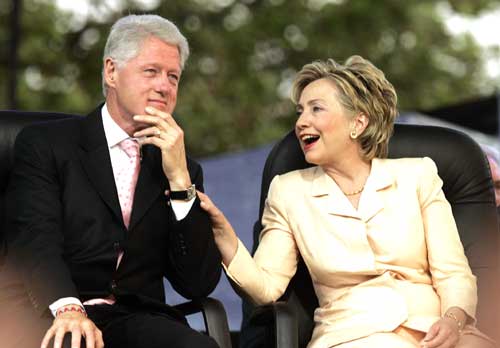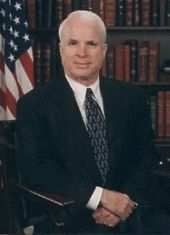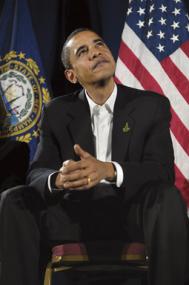By Nick Li
US Presidential Candidates
 The U.S. has seen a rhetorical swing towards protectionism in the past few years, thanks to large trade deficits, continued economic weakness in the "Rust Belt" and the hard work of the next generation populists like Lou Dobbs (for a hilarious display of jingoism gone awry, check out his recent campaign to prevent a Chinese sculptor from doing part of the Martin Luther King Memorial in Washington, D.C.). While Bill Clinton ratified NAFTA in 1994 (the North American Free Trade Agreement), Hillary Clinton recently voted against CAFTA (the Central American Free Trade Agreement), indicating how far the pendulum has swung in the last decade for the American left.
The U.S. has seen a rhetorical swing towards protectionism in the past few years, thanks to large trade deficits, continued economic weakness in the "Rust Belt" and the hard work of the next generation populists like Lou Dobbs (for a hilarious display of jingoism gone awry, check out his recent campaign to prevent a Chinese sculptor from doing part of the Martin Luther King Memorial in Washington, D.C.). While Bill Clinton ratified NAFTA in 1994 (the North American Free Trade Agreement), Hillary Clinton recently voted against CAFTA (the Central American Free Trade Agreement), indicating how far the pendulum has swung in the last decade for the American left.  The strongest Republican candidates are all unabashed free traders, though in the U.S. being a Republican free-trader means that you favor lopsided bilateral deals with poor countries that will do nothing to anger the powerful farm lobby (ah, the beauties of a federal system where New York gets the same senate representation as Montana). John McCain and Sam Brownback, two of the leading contenders, both get a 100% free-trade rating from the Cato institute. Rudy Giuliani and Mitt Romney, the two other front-runners, are harder to place because they have no legislative record on trade, but neither seems interested in stoking the populist fires of protectionism. Expect Republican candidates to rattle the sabre at the Chinese and demand "fairness" in trade with all partners, but to continue pushing bilateral and regional deals aggresively.
The strongest Republican candidates are all unabashed free traders, though in the U.S. being a Republican free-trader means that you favor lopsided bilateral deals with poor countries that will do nothing to anger the powerful farm lobby (ah, the beauties of a federal system where New York gets the same senate representation as Montana). John McCain and Sam Brownback, two of the leading contenders, both get a 100% free-trade rating from the Cato institute. Rudy Giuliani and Mitt Romney, the two other front-runners, are harder to place because they have no legislative record on trade, but neither seems interested in stoking the populist fires of protectionism. Expect Republican candidates to rattle the sabre at the Chinese and demand "fairness" in trade with all partners, but to continue pushing bilateral and regional deals aggresively.  The Democratic camp is more divided and thus more interesting. Hillary Clinton and John Edwards both received a 17% free-trade rating from Cato, while Barack Obama has not received a rating yet. Are there differences between these candidates on trade issues? A glance at their recent voting records reveals that there are subtle differences. Senator Clinton voted YES on free-trade agreements with Chile, Singapore and Oman, but NO on CAFTA (the Central American Free Trade Agreement) and NO on a free trade agreement with the Andean nations. John Edwards, on the other hand, has been a much more consistent opponent of free trade, opposing the deals with Chile and Singapore. Senator Obama has not had much time to position himself on trade issues, but he is sometimes seen as the most free-trade candidate in the Democratic party. His explanation for his NO vote on CAFTA, suggests that he is trying to walk the same line as Sarkozy – "protection without protectionism." Obama supports free trade but only after there is a "national commitment" to protect workers from the dislocations caused by free trade. I think he is positioning himself in the center between Edwards and Clinton, but his position on trade, like most other issues, is (intentionally?) vague and ill-defined. Bottom line – expect Republicans and Democrats alike to continue to placate the Farm Lobby, and for Democrats, if they win, to push for more protectionism and slow the pace of regional and multilateral trade negotiations by insisting on greater labour and environmental standards. The next interesting test will be the vote on whether to renew President Bush’s fast-track authority when it expires in June. Part 3 of 3 – Nick
The Democratic camp is more divided and thus more interesting. Hillary Clinton and John Edwards both received a 17% free-trade rating from Cato, while Barack Obama has not received a rating yet. Are there differences between these candidates on trade issues? A glance at their recent voting records reveals that there are subtle differences. Senator Clinton voted YES on free-trade agreements with Chile, Singapore and Oman, but NO on CAFTA (the Central American Free Trade Agreement) and NO on a free trade agreement with the Andean nations. John Edwards, on the other hand, has been a much more consistent opponent of free trade, opposing the deals with Chile and Singapore. Senator Obama has not had much time to position himself on trade issues, but he is sometimes seen as the most free-trade candidate in the Democratic party. His explanation for his NO vote on CAFTA, suggests that he is trying to walk the same line as Sarkozy – "protection without protectionism." Obama supports free trade but only after there is a "national commitment" to protect workers from the dislocations caused by free trade. I think he is positioning himself in the center between Edwards and Clinton, but his position on trade, like most other issues, is (intentionally?) vague and ill-defined. Bottom line – expect Republicans and Democrats alike to continue to placate the Farm Lobby, and for Democrats, if they win, to push for more protectionism and slow the pace of regional and multilateral trade negotiations by insisting on greater labour and environmental standards. The next interesting test will be the vote on whether to renew President Bush’s fast-track authority when it expires in June. Part 3 of 3 – Nick

Well, no sooner did I write the above than it appears the US congress has reached a “compromise” deal with the President, which will involve renewing fast track authority and negotiating agreements with Peru, Colombia, Panama and Korea. The interesting is how weak the “labor and environmental” standards provisions are that were needed to get support from Democratic party leaders – they basically just have to abide by existing ILO and international treaty obligations on the environment. Some of the house Democrats are furious, and it is interesting to see how the leadership is steering away from protectionism, in actions if not in rhetoric. Perhaps we should expect the same from the Presidential candidates. Some additional info on Hillary Clinton and her positions on trade – http://www.bloomberg.com/apps/news?pid=20601070&sid=atUKcP4eSEvY&refer=politics